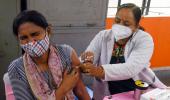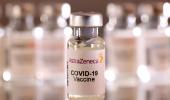India currently does not have any XBB 1.5 variant-based vaccines available.

New-generation Covid vaccines may soon be available in India as many companies prepare to launch them amid a rise in new cases in some parts of the world, particularly Singapore.
Hyderabad-based Biological E has begun clinical trials of a next-generation Covid vaccine to combat the XBB1.5 variant of the Sars-CoV-2 virus and expects preliminary results in June.
A Subject Expert Committee last month recommended granting permission to the Pune-based Serum Institute of India for an Omicron XBB1.5 variant-based COVID-19 vaccine, with a local clinical trial waiver for emergency use.
Currently, India does not have any XBB 1.5 variant-based vaccines available.
"None of the vaccines available are protective against the currently circulating COVID-19 strains or those likely to emerge," senior epidemiologist Dr Jayaprakash Muliyil told Business Standard.
"On the other hand, the Omicron group has turned out to be mild, requiring no protection. Omicron also imparts good immunity against COVID-19," Dr Muliyil added.
These new-generation vaccines align with the World Health Organisation guidelines, which recommended a monovalent XBB1.5 antigen composition for the Covid vaccine antigen in December.
WHO said the SARS-CoV-2 virus continued to evolve with important genetic and antigenic changes in the spike protein.
Given the current Sars-CoV-2 evolution and the breadth of immune responses demonstrated by monovalent XBB1.5 vaccines against circulating variants, the WHO Technical Advisory Group (TAG) had in December recommended retaining XBB 1.5 as the COVID-19 vaccine antigen.
Biological E received approval from India's drug regulator to start clinical trials for this new-generation vaccine in December-January.
A company source told Business Standard it had already begun clinical trials at several sites and expected to come out with the initial results in June.
The SEC had granted permission for a prospective single-blind randomised phase 3 comparative study to evaluate immunogenicity and safety of Biological E's XBB 1.5 receptor binding domain subunit Covid-19 vaccines in individuals aged 5-80 years on December 7.
Meanwhile, the SEC recommended grant of permission to SII's XBB 1.5 variant-based vaccine for restricted use in emergencies with a local clinical trial waiver.
This vaccine, based on the Novavax Covid-19 vaccine that SII makes but using a different strain (XBB 1.5), is recommended for use in individuals aged 12 years or older.
The SII presented preclinical study reports and interim reports of the ongoing clinical trials in the US to evaluate the safety and immunogenicity of an XBB1.5 booster dose.
Novovax has approval from various countries, such as the US, and the European Union (EU) bloc.
The SEC noted in its report that around 42 million doses had been exported to the US and the EU till April and 200,000 doses were administered in the US with no safety concerns to date.
The Subject Expert Committee also noted that there was an 'unmet medical need' in the country.
'Presently, there is no vaccine with XBB 1.5 strain approved in the country,' it said.
The Serum Institute has been asked to conduct a Phase 4 study in India and submit the protocol for the study in three months.
Phase 4 studies are done to check a drug or vaccine's performance in real-life scenarios to study the long-term risks and benefits of using the product.
These developments are significant as COVID-19 resurges in some parts of the world. Singapore is monitoring a new wave of infections, with weekly cases doubling to 25,900 in mid-May and average daily hospitalisations rising to 250.
The Singapore government has asked public hospitals to reduce non-urgent elective surgeries to increase bed capacity.
As the Sars-CoV-2 virus continues to mutate, WHO came out with another recommendation on April 26, saying the virus is expected to continue to evolve from JN.1, and therefore, the WHO TAG advises the use of monovalent JN.1 lineage as the antigen in future formulations of COVID-19 vaccines.
This is similar to the guidance WHO issues on influenza strains, and which antigen to be used in developing the flu shots.
Experts suggest maintaining a contingency stockpile of vaccines Dr Shahid Jameel, virologist and research fellow at Green Templeton College, University of Oxford, told Business Standard recently: "India has covered enough population with vaccine and infection, but protein vaccines should remain available on payment basis for elderly and those with comorbidities."
Dr Jameel clarified that even if the elderly had taken their three shots, these vaccines need to be available, but the government should not be required to make it free.
Feature Presentation: Ashish Narsale/Rediff.com












 © 2025
© 2025